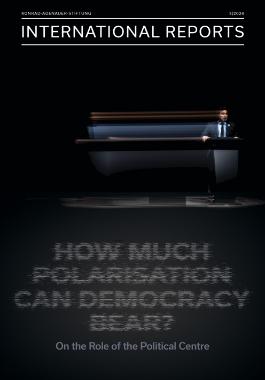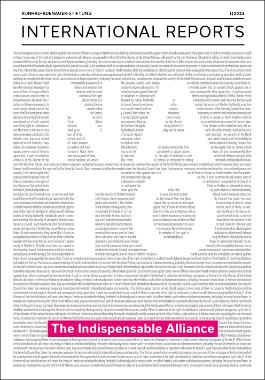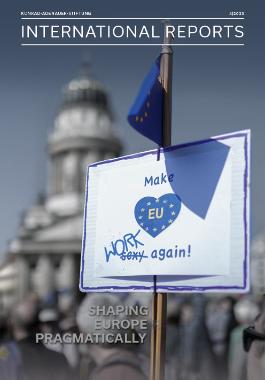Asset Publisher
Issues
Asset Publisher

America First – Again. How the World Is Dealing with Donald Trump’s Foreign Policy
Donald Trump has been back in the White House for almost a year. Many in Germany and Europe had feared this return, and they were not alone in this fear – consider Canada or Mexico, for example. But there were also those who had placed great hopes in Trump's second presidency: in the Gulf states, for example, or in Israel. What has the first year of Trump 2.0 actually brought for the different countries and regions of the world? Here is a tentative assessment.
America First – Again. How the World Is Dealing with Donald Trump’s Foreign Policy
 Xinhua, Imago
Xinhua, Imago
Development Cooperation – Global Trends and Lessons for Germany
Why is development cooperation necessary? Reducing poverty in partner countries is part of the answer. But to convince an increasingly critical audience in Western societies, development cooperation must also clearly serve our own interests: both economically and in terms of security policy. Can we learn something from other countries in this regard? The new issue of International Reports takes a look around the globe: from China to the United Kingdom, from Japan to Turkey.
Development Cooperation – Global Trends and Lessons for Germany
 Aurelien Morissard, IP3press, Imago
Aurelien Morissard, IP3press, Imago
New Old Wounds – Colonial Legacy and Foreign Policy
You might think of colonial legacy as a topic for museums and history books. But the issue is actually of enormous political relevance as well. That is because, in addition to such worthwhile concerns as addressing colonial crimes, an influential “postcolonial” discourse has also emerged that attributes virtually every evil in the world to alleged Western “coloniality”, and is thus as misguided as it is harmful.
New Old Wounds – Colonial Legacy and Foreign Policy

Water
Ecosystem, resource, conflict arena: there are many ways in which water is relevant to international politics. This issue of International Reports offers you in-depth analyses from Lake Chad to the Jordan river, from the South China Sea to Costa Rica.
Water

Under the Radar. The World’s Forgotten Crises
Even crises that have flown under the radar for years can suddenly and unexpectedly escalate or take new turns, as the recent example of Syria has clearly shown. In this issue, we look into other crises and conflicts smouldering around the world, and ask what Germany’s and Europe’s priorities should be.
Under the Radar. The World’s Forgotten Crises

How Much Polarisation Can Democracy Bear?
The issue of the political centre is booming internationally – although mostly not because of good election results, but because of widespread concern about its alleged or actual erosion in many democracies worldwide. Is the centre in decline everywhere? What can its representatives do? And is polarisation inherently bad for a democracy?
How Much Polarisation Can Democracy Bear?
 Planet Labs Inc. via AP, picture alliance
Planet Labs Inc. via AP, picture alliance
What Will Become of Globalisation?
International economic organisations are sounding the alarm bells over “geoeconomic fragmentation”, i.e. the realignment of trade and financial flows along geopolitical blocs. And while we should take the warnings about a potential loss of prosperity seriously, it is still right for German and European policymakers to pay more attention than before to the possibility of economic dependencies turning into a security risk.
What Will Become of Globalisation?

NATO. The Indispensable Alliance
NATO turns 75 and an increasing number of people in Germany once again recognise the organisation for what it is: the indispensable alliance for our security. What can we do to keep the United States engaged in NATO? What role can the alliance play in the Indo-Pacific and on its southern flank? And why is its partnership policy with countries from Asia to Latin America so important? Read this issue of International Reports to find out!
NATO. The Indispensable Alliance
 Thomas Imo, photothek, picture alliance
Thomas Imo, photothek, picture alliance
Shaping Europe Pragmatically
Europe must finally speak with one voice! We have heard that call again and again. In some cases it has been heeded, but more often, it has not – and things are not necessarily getting better. But if that is the case and the big European policy breakthrough is not to be expected in the near future, we should concentrate our energy on taking the many small, unspectacular but effective steps that will enable our continent to survive in an increasingly uncomfortable global environment. Read this issue of International Reports to learn about some of them.
Shaping Europe Pragmatically
 Thomas Imo, photothek, picture alliance
Thomas Imo, photothek, picture alliance
Aspiration and Reality. On German Development Cooperation
What can and should German development cooperation achieve? Fighting poverty, of course! Economic progress, obviously! But climate protection and preventing pandemics are also on the agenda today. And the wish list seems to be inexhaustible. In this issue of International Reports, we point out why good intentions do not necessarily produce good results and why German development cooperation would be well-advised to focus on the essentials.
Aspiration and Reality. On German Development Cooperation
Showing 1 to 10 of 256 entries.
Asset Publisher
About this series
International Reports (IR) is the Konrad-Adenauer-Stiftung's periodical on international politics. It offers political analyses by our experts in Berlin and from more than 100 offices across all regions of the world. Contributions by named authors do not necessarily reflect the opinions of the editorial team.
Order details
Editor
Dr. Gerhard Wahlers
ISBN
0177-7521






